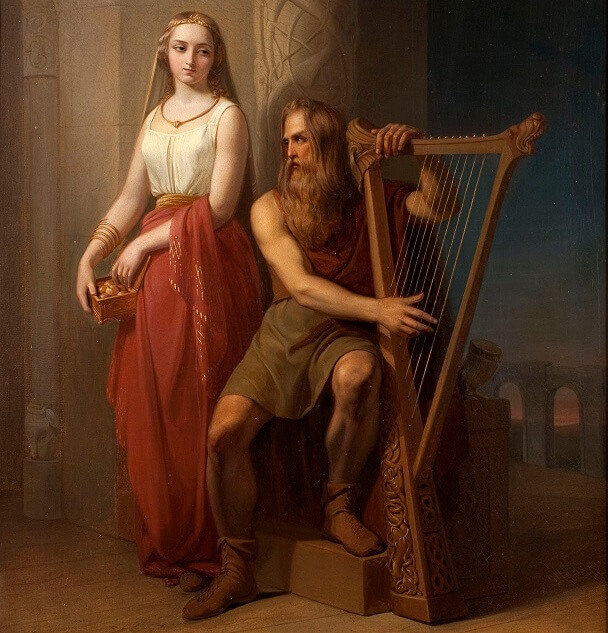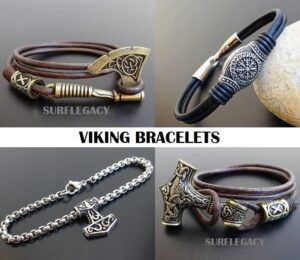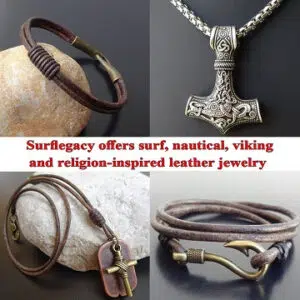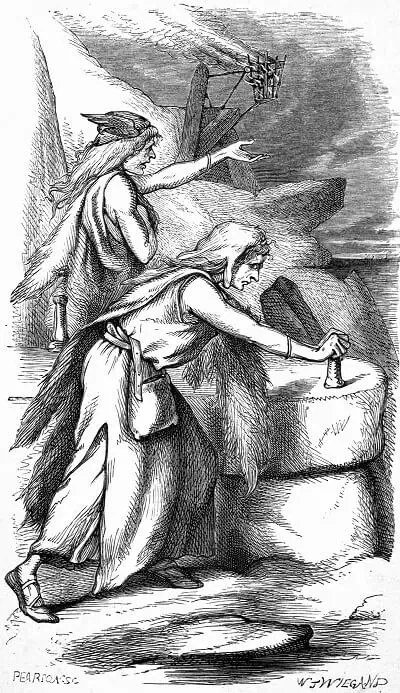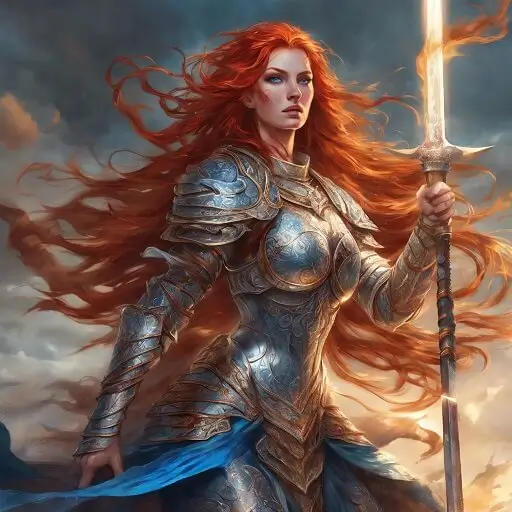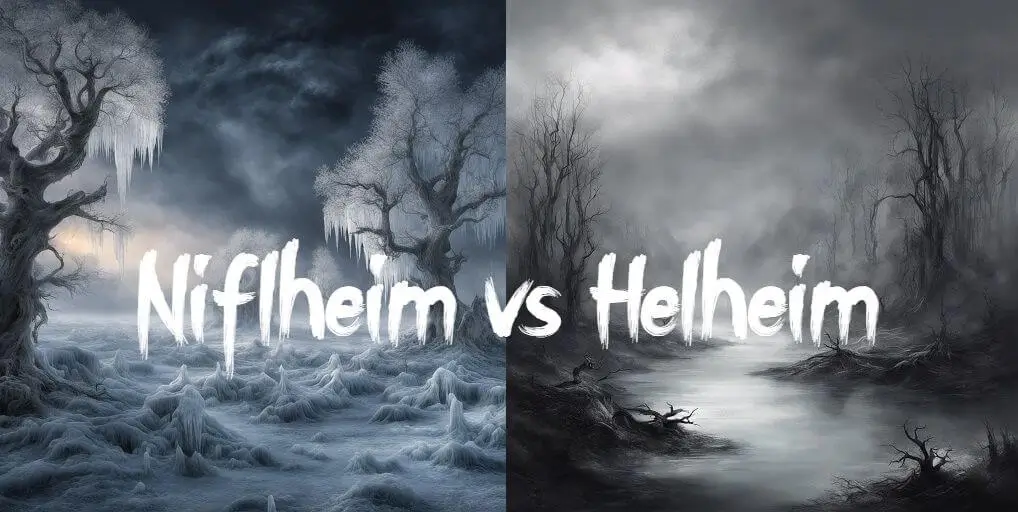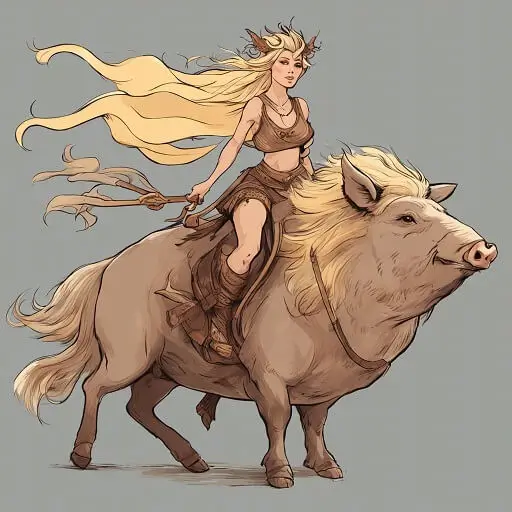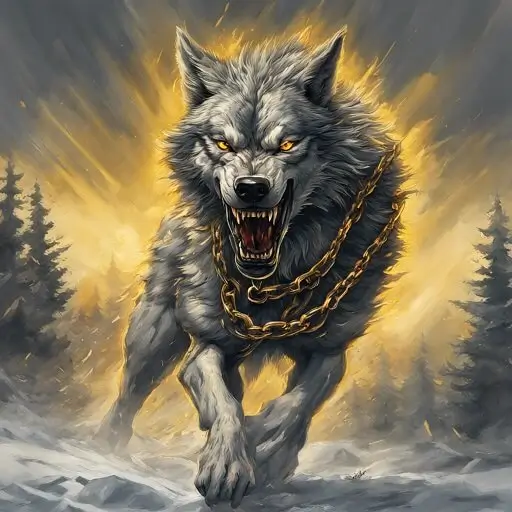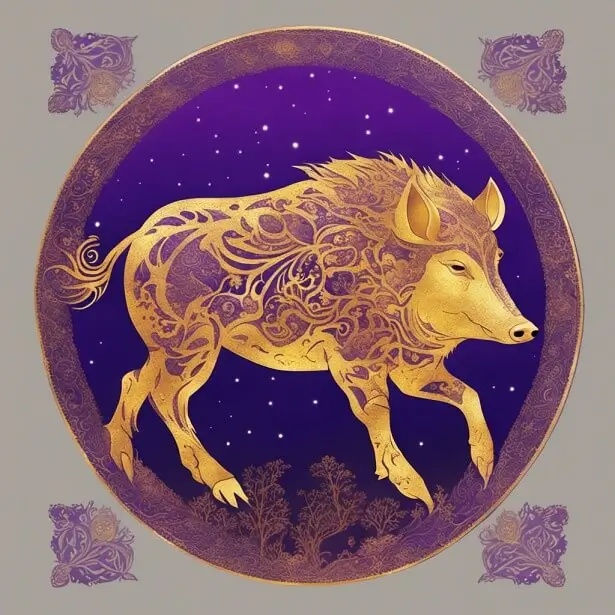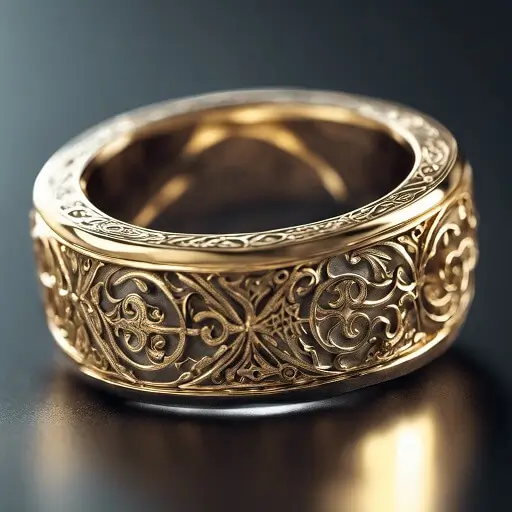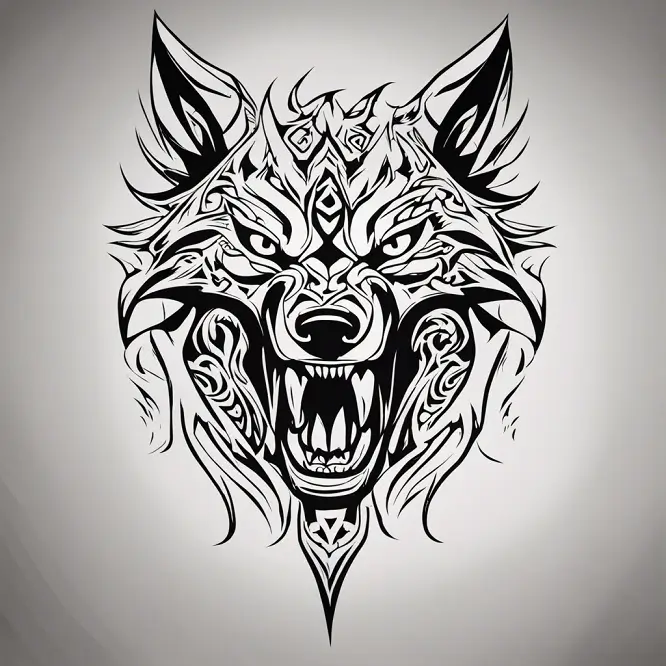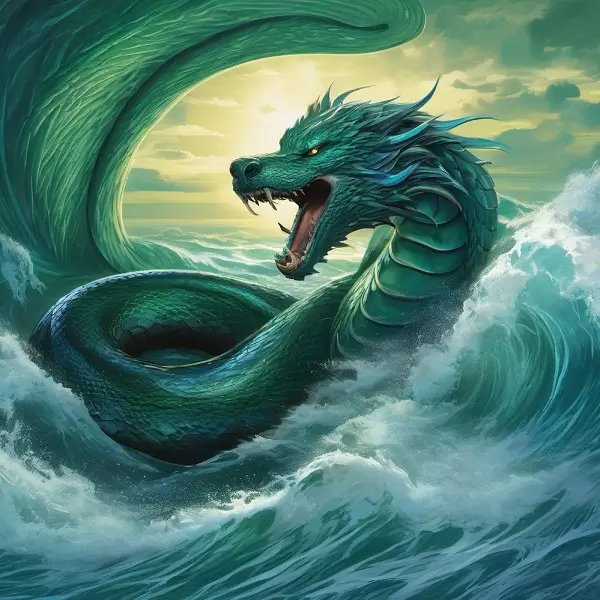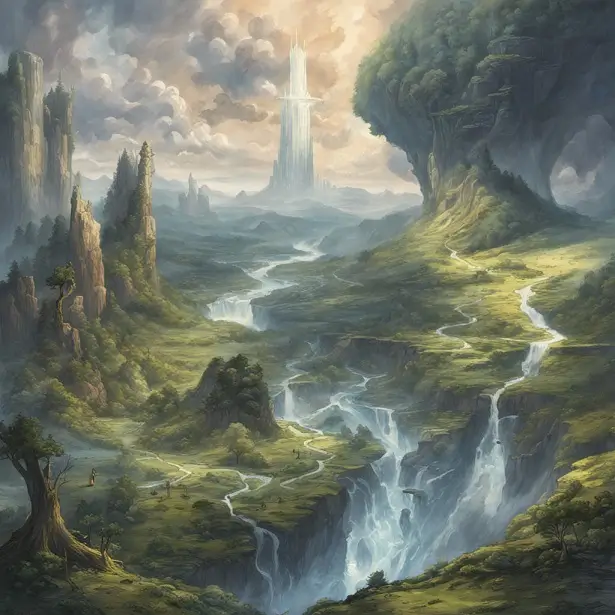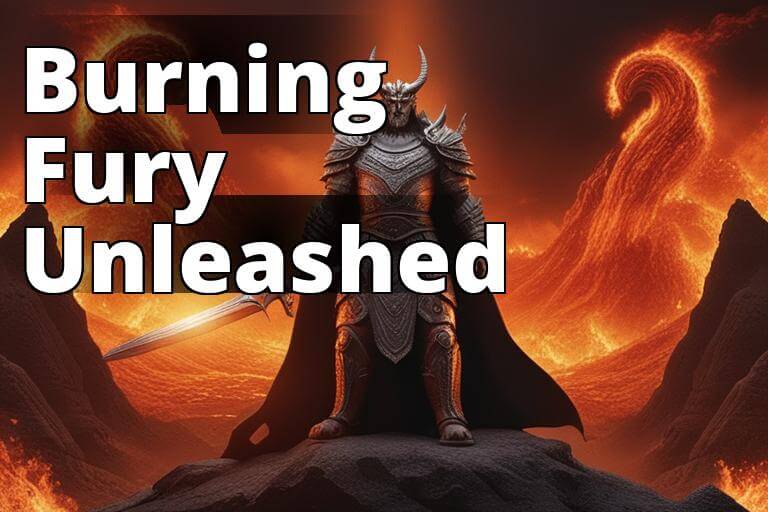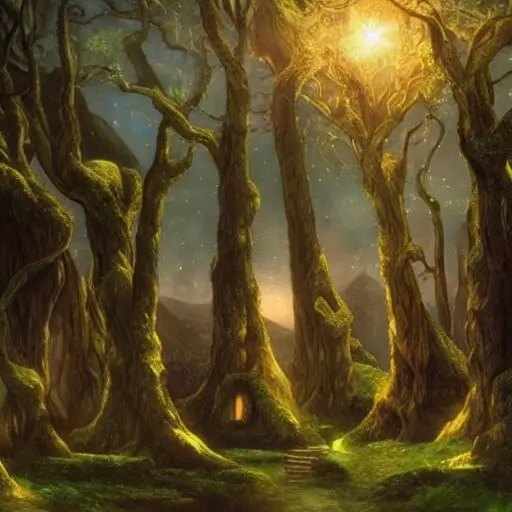Welcome to the intriguing world of Norse mythology, where gods and goddesses weave tales of epic proportions. Among these divine figures, one stands out not for his physical prowess, but for his intellectual mastery – Bragi, the god of poetry and eloquence.
Bragi, the divine bard of Asgard, uses his words to share wisdom, celebrate heroes, and commemorate the noble dead. His role, while perhaps lesser-known, is deeply embedded in the cultural fabric of the ancient Norse people.
In this exploration, we’ll delve into Bragi’s origins, his role in the sagas, his symbols, and his enduring influence.
Who is Bragi in Norse Mythology?
Bragi is a significant figure in Norse mythology, revered as the god of poetry, eloquence, and music.
Bragi is often depicted as an old man with a long beard, symbolizing wisdom, and he is usually seen with a harp, signifying his mastery over music. He is noted for his wisdom and eloquence, frequently using his gift of words to mediate conflicts among the gods, a role that earned him the respect of other deities in the Norse pantheon.
The Etymology and Historical Context of Bragi
The Meaning of Bragi in Old Norse
To understand Bragi, we first need to delve into the meaning of his name. In Old Norse, ‘Bragi’ is commonly associated with the word ‘bragr’, which translates to “poetry” or ‘the best, the first, or the foremost’. This translation, fittingly, places Bragi as the premier poet, the finest of the fine in the realm of eloquence and poetry.
Historical and Archaeological Evidence of Bragi Worship
While there is limited archaeological evidence of direct Bragi worship, his presence is unmistakable in the historical texts and sagas of Norse culture. He is mentioned in both the Poetic Edda and the Prose Edda, two of the most vital sources of Norse mythology.
Snorri Sturluson writes about him in the Gylfaginning
One is called Bragi: he is renowned for wisdom, and most of all for fluency of speech and skill with words. He knows most of skaldship, and after him skaldship is called bragr, and from his name that one is called bragr-man or -woman, who possesses eloquence surpassing others, of women or of men. His wife is Iðunn.
and in Skáldskaparmál
How should one periphrase Bragi? By calling him husband of Iðunn, first maker of poetry, and the long-bearded god (after his name, a man who has a great beard is called Beard-Bragi), and son of Odin.
In addition, Bragi is often depicted in medieval artwork, usually portrayed with a harp, symbolizing his connection to music and poetry.
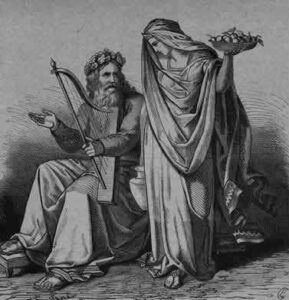
Bragi with idunn
Runic inscriptions have also hinted at Bragi’s reverence. For instance, the Rök runestone in Östergötland, Sweden, a monument from the Viking Age, contains a lengthy inscription featuring complex poetry, which some scholars suggest may be associated with the practice of invoking Bragi.
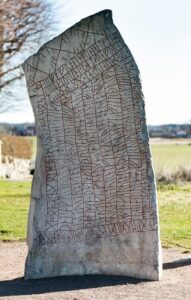
Rök runestone
The Cultural Significance of Bragi in the Viking Age
Bragi’s significance in the Viking Age extends beyond his role as the god of poetry. He embodies the importance the Norse placed on the power of language and the spoken word. In a society where oral tradition was paramount and deeds of heroes were immortalized through skaldic poems, Bragi’s role was of profound importance.
Moreover, Bragi is believed to be a god who possessed the power of galdr, a form of magic strongly tied to chanting incantations, further emphasizing the importance of the spoken word. Through his voice, he could influence the course of events, making him a significant figure in Viking Age cultural practices.
In the next sections, we’ll continue our exploration of Bragi, tracing his origins, familial connections, and his role in the vibrant tapestry of Norse mythology.
Bragi’s Origins and Family
The origins of Bragi, like many figures in Norse mythology, are somewhat shrouded in mystery. His lineage is not entirely clear-cut, with various sources suggesting different parentage.
Most commonly, Bragi is described as the son of Odin, the Allfather and chief of the Æsir gods, and Gunnlöð, a giantess known for her association with wisdom and knowledge. This lineage aligns Bragi with the divine lineage and establishes his connection with wisdom and eloquence, traits associated with both his parents.
However, some sources suggest that Bragi may not have been born a god but was a historical poet who was later deified. This theory proposes that Bragi Boddason, the earliest known skald (poet) in Norse history, was elevated to divine status, blending the lines between the historical and the mythical.
His Relationship to Other Deities, Including His Wife Idun
Bragi is famously married to Idun, the goddess of youth and rejuvenation, who is responsible for keeping the gods eternally young with her magical apples. Their marriage symbolizes a harmonious union of intellect and vitality, reflecting the Norse appreciation for balance and duality.
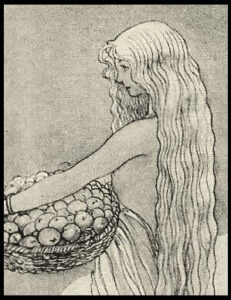
Idunn
Bragi is also known for his interactions with other deities, especially during feasts in Asgard, where he would use his eloquence and poetic prowess to entertain and maintain harmony amongst the gods.
Discussion on the Debate Whether Bragi is a Later Personification of the Skaldic Tradition
A fascinating debate surrounding Bragi is whether he was an original deity in the Norse pantheon or a later personification of the skaldic tradition. Some scholars argue that the lack of archaeological evidence of Bragi worship and the ambiguity surrounding his lineage may suggest that he was a historical figure, specifically Bragi Boddason, who was later deified due to his exceptional poetic talent.
This idea proposes that Bragi, as we know him, is essentially a divine representation of the respect and reverence the Norse culture had for poetry and eloquence. It encapsulates the critical role skalds played in the social and cultural life of the Vikings, acting as historians, entertainers, and even diplomats.
Whether a god from birth or a deified poet, Bragi’s legacy in Norse mythology is undeniable. In the coming sections, we’ll delve deeper into his role and presence in the epic sagas and eddas that form the cornerstone of our understanding of Norse mythology.
Bragi’s Role in Norse Mythology
Bragi as the God of Poetry and Eloquence
Bragi holds a unique position within the Norse pantheon as the deity of poetry, eloquence, and music. His mastery over words extends beyond mere verse creation. Bragi’s eloquence is said to captivate listeners, evoke emotions, and even influence outcomes. He is the divine skald, the bard of Asgard, whose songs and tales enliven the halls of gods.
The Significance of Poetry and Eloquence in Norse Culture
In the oral tradition of the Vikings, poetry and eloquence held paramount importance. Skaldic poetry, a complex and intricate verse form, was a revered craft, often used to commemorate heroes, record history, and express wisdom. The skalds, or poets, were highly respected individuals, their words carrying the weight of honor and truth.
Eloquence was equally valued. A well-spoken individual was respected, their words capable of swaying opinions, resolving disputes, and encouraging allies. Bragi, as the god of poetry and eloquence, embodied these cultural values, representing the power and prestige of the well-spoken word.
Bragi’s Role in Divine Assemblies and Celebrations, Such as Aegir’s Feast
Bragi’s presence was particularly notable during divine assemblies and celebrations. He often acted as a peacekeeper, using his eloquence to prevent disputes among gods. A prime example of this is during the feast at Aegir’s hall, as described in the Lokasenna, part of the Poetic Edda. Bragi is depicted as trying to maintain harmony during Loki’s provocations, demonstrating his role as a diplomatic force within the divine community.
Bragi and the Runes: The Connection to Wisdom and Prophecy
Bragi’s association with the runes is another crucial aspect of his character. Runes, in Norse culture, were not just an alphabet but were believed to have magical properties and were used for divination and prophecy.
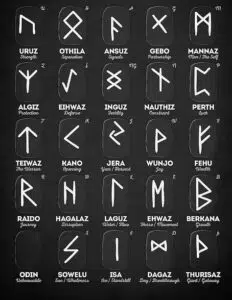
As a god of poetry and eloquence, Bragi’s link to the runes suggests a deeper connection to wisdom and foreknowledge.
The runes are often seen as a source of hidden wisdom, their cryptic symbols holding profound truths. Some interpretations suggest that Bragi, with his eloquence, could unlock these truths, making him a divine intermediary between the mystical language of the runes and the understanding of gods and men.
Whether through his poetry, eloquence, peacemaking, or connection to the runes, Bragi’s role in Norse mythology underlines the importance of the spoken word, wisdom, and the power of communication in ancient Norse culture.
His character offers valuable insights into the cultural fabric of the Viking Age, emphasizing the significant role of language and poetry in shaping social and divine interactions.
Bragi’s Involvement in the Epic Sagas and Eddas
Bragi’s Appearances in the Poetic Edda and Prose Edda
Bragi’s presence can be found in the epic tales of Norse mythology, particularly in the Poetic Edda and Prose Edda. These two sources, compiled from ancient oral tradition, offer the most comprehensive view of Norse mythology, and Bragi often appears as a significant figure within these narratives.
In the Poetic Edda, Bragi is portrayed mainly as a figure of wisdom and eloquence, using his skills in poetry and words to mediate conflicts and keep peace among the gods. Meanwhile, in the Prose Edda, written by the Icelandic historian and poet Snorri Sturluson, Bragi’s role as the god of poetry is further emphasized. Snorri presents Bragi as a knowledgeable figure who educates others about the traditions of skaldic poetry.
Lokasenna
One of the most memorable appearances of Bragi is in the Lokasenna, a part of the Poetic Edda. The Lokasenna is a flyting, a contest of insults, involving Loki and other gods during a feast in Aegir’s hall. Here, Bragi’s role as a peacekeeper comes to the fore.
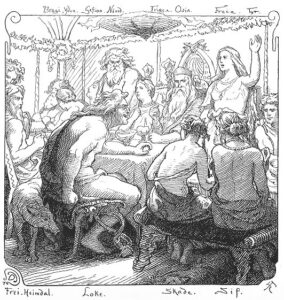
Loki arguing with the gods by Lorenz Frølich
When Loki starts insulting the gods, it’s Bragi who attempts to maintain harmony among the divine assembly. He doesn’t succeed in preventing the escalating conflict, but his attempts to restore peace highlight his diplomatic role within the pantheon.
From the Lokasenna
- Loki:
- “Hail, Æsir!
- Hail, Asyniur!
- And ye, all-holy gods!
- all, save that one man,
- who sits within there,
- Bragi, on yonder bench.”
- Bragi:
- “I know that were I without,
- as I am now within,
- the hall of Ægir,
- I thy head would
- bear in my hand,
- and so for lying punish thee.”
Roles of Bragi in Skaldic Poetry
Besides the Eddas, Bragi also appears in skaldic poetry, the complex verse form composed by court poets in the Viking Age and the early Middle Ages. As the god of poetry, it’s fitting that his name often appears in the verses of skaldic poems, usually as a kenning (metaphor) for a poet.
For example, in the 9th-century “Ragnarsdrápa” by Bragi Boddason, the term “Bragi” is used to refer to the poet himself. This usage of “Bragi” as a synonym for a poet further solidifies his association with the craft of poetry.
Whether through his appearances in the Eddas or his presence in skaldic verse, Bragi’s influence in Norse literature is significant. His character embodies the high regard for poetry and eloquence in Norse culture and serves as a symbol of the integral role language and communication played in their society.
Bragi’s Symbols and Associations
The Association of Bragi with the Harp and Music
Bragi is frequently associated with the harp and music, symbolic of his role as the divine bard of Asgard. In numerous depictions, Bragi is shown with a harp, his fingers poised to strike its strings, ready to produce enchanting melodies that accompany his eloquent words.
This association aligns with the Norse tradition of skalds often delivering their verses to the accompaniment of a harp or similar instrument. The harp, therefore, symbolizes not only Bragi’s musical talent but also his command over the poetic arts.
Bragi’s Ship, Bragafull, and its Symbolic Meaning
An interesting symbol associated with Bragi is Bragafull, often translated as “Bragi’s cup” or “Bragi’s pledge.” This term appears in sagas and eddas, usually referring to a ceremonial toast made in honor of a fallen hero.
The one who makes the toast pledges to undertake a heroic deed, which then is commemorated in a skaldic verse. As the god of poetry and eloquence, Bragi’s connection to these ceremonial toasts symbolizes the critical role of language in commemorating valor and maintaining the memory of heroic deeds in Norse society.
The Runes and their Connection to Bragi
Bragi is also closely connected to the runes, the ancient Norse alphabet used for communication, divination, and magical practices. The runes are often seen as a source of hidden wisdom, and their association with Bragi ties him to the deeper, mystical aspects of language and communication.
This connection is particularly relevant given the significant role of runes in casting spells and prophecies in the Norse spiritual practice, highlighting Bragi’s role as a divine intermediary between the cryptic language of the runes and the understanding of gods and men.
These symbols and associations – the harp, the Bragafull, and the runes – not only enrich our understanding of Bragi but also offer a window into the culture that revered him. They underscore the importance of language, poetry, music, memory, and mystical wisdom in the worldview of the ancient Norse people.
The Legacy of Bragi in Modern Culture
The Influence of Bragi on Contemporary Literature and Media
Bragi’s legacy extends into contemporary literature and media, where he often appears as a figure associated with poetry, eloquence, and wisdom. For instance, in fantasy literature, such as in works inspired by Norse mythology, Bragi often appears as a bard-like figure or a sage.
In the realm of comic books, Marvel’s interpretation of the Norse pantheon includes Bragi, where he embodies his traditional role as the god of poetry.
Bragi in Modern Neopagan Practices, such as Asatru
In modern neopagan practices, including Asatru, a contemporary revival of Norse paganism, Bragi holds a place of honor.
As the god of poetry, eloquence, and wisdom, he is often invoked in rituals and ceremonies, particularly those involving the arts or the pursuit of knowledge. For instance, the Bragafull, or “Bragi’s toast,” has been revived in some Asatru practices as a ceremonial pledge made during special gatherings or feasts.
The Use of Bragi as a Symbol of Inspiration and Creativity in Popular Culture
In popular culture, Bragi is often used as a symbol of inspiration and creativity. His name is invoked in contexts that emphasize the power of language, creativity, and wisdom. He has even lent his name to a music app, “Bragi,” further emphasizing his association with music and creative expression.
The endurance of Bragi’s legacy in modern culture testifies to the timeless appeal of his character and the values he represents. His association with poetry, eloquence, wisdom, and inspiration continues to resonate, affirming the importance of these qualities in human culture, past and present.
Bragi, the god of poetry, thus continues to inspire, reminding us of the enduring power of words and the magic of creative expression.
Bragi Norse Mythology Faqs
How does Bragi compare to similar deities in other mythologies?
In terms of his domain over eloquence and poetry, Bragi could be compared to figures like Apollo from Greek mythology, who was also a god of music and poetry. However, each mythology has its unique characteristics, and such comparisons should consider cultural context.
What happens to Bragi at Ragnarok?
A: The Norse texts are not clear on Bragi’s fate during Ragnarok, the end of the world in Norse mythology. Unlike some other gods whose deaths are explicitly mentioned, Bragi’s fate is left uncertain. However, it’s generally assumed that many of the gods perish in this cataclysmic event.
Is Bragi the son of Odin?
Yes, according to most accounts, Bragi is considered the son of Odin, the Allfather, and Gunnlöð, a giantess. This places Bragi among the Aesir, the principal group of gods in Norse mythology.
Who is the Norse god Bragi’s wife?
A: Bragi is married to Idun, the goddess of youth and rejuvenation. Idun is known for her apples, which provide the gods with eternal youth.
What is the story of Bragi?
A: Bragi is the god of poetry and eloquence in Norse mythology. He is often depicted as a wise and peaceful figure, who uses his mastery over language to mediate conflicts among the gods. Bragi is also known for his role in various sagas and eddas, where he is portrayed as the divine bard of Asgard.
How were Bragi and Idun married?
A: The Norse texts do not provide a detailed account of Bragi and Idun’s marriage. However, their union is often depicted as harmonious and loving, embodying the complementary aspects of wisdom (represented by Bragi) and rejuvenation (represented by Idun). Their relationship reminds us of the importance of balance and harmony in Norse mythology and culture.
Shop Norse Jewelry
Are passionate about Vikings or Norse Myths?
Finding the ideal piece of Viking Jewelry can be challenging and time-consuming, especially if you lack inspiration or don’t know where to look.
Surflegacy, has you covered. We have a wide range of Handmade Jewelry in various styles, shapes, colors, and materials, to accentuate your Viking spirit and look. Do not hesitate to visit our selection HERE
Whatever you wear, you’ll find the ideal trendy piece to complement your wardrobe. Our jewelry is designed to be worn every day, no matter where you go or what season is. Are you ready to step up your wardrobe game?

